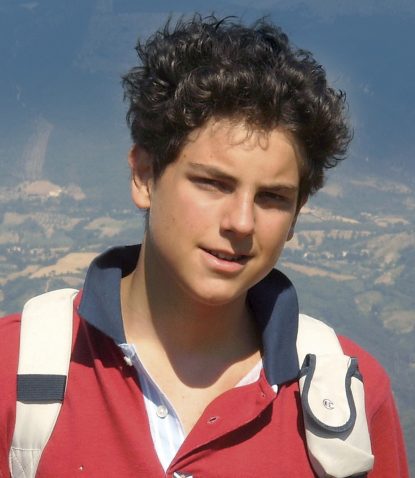
Carlo Acutis, who was born in 1991 in London and died in 2006 in Monza, Italy, is pictured in an undated photo. Pope Francis formally recognized a miracle attributed to the intercession of the 15-year-old Italian teenager who the pope has said is a role model for young men and women today.(CNS photo/courtesy Sainthood Cause of Carlo Acutis)
VATICAN CITY (CNS) — Pope Francis formally recognized a miracle attributed to the intercession of Carlo Acutis, a 15-year-old Italian teenager who the pope has said is a role model for young men and women today.
In a meeting Feb. 22 with Cardinal Giovanni Angelo Becciu, prefect of the Congregation for Saints’ Causes, the pope advanced the sainthood causes of Acutis, as well as one woman and seven men, including Jesuit Father Rutilio Grande and his two companions who were murdered in El Salvador in 1977.
The Vatican announced Feb. 23 that the pope had signed the decrees.
Antonia Salzano, Acutis’ mother, told Catholic News Service Feb. 24 that the news of the pope’s approval made her “really, really happy.”
“Pope Francis has always been close to Carlo; he quoted him in ‘Christus Vivit,’ and this was a great privilege in that he cited him as an example for young people in the whole world,” Salzano said.
In “Christus Vivit” (“Christ Lives”), Pope Francis’ exhortation on young people, he said the teen was a role model for young people today who are often tempted by the traps of “self-absorption, isolation and empty pleasure.”
[hotblock]
“Carlo was well-aware that the whole apparatus of communications, advertising and social networking can be used to lull us, to make us addicted to consumerism and buying the latest thing on the market, obsessed with our free time, caught up in negativity,” the pope wrote.
“Yet he knew how to use the new communications technology to transmit the Gospel, to communicate values and beauty,” he said.
Before his death from leukemia in 2006, Acutis was an average teen with an above-average knack for computers. He put that knowledge to use by creating an online database of Eucharistic miracles around the world.
[hotblock2]
Salzano told CNS that her son’s work, which included a traveling exhibition of eucharistic miracles, has been displayed “on every continent” and was the inspiration behind the documentary, “Segni” (“Signs”) which was produced by the Vatican Dicastery for Communication in October 2018.
His devotion to spreading the word about Eucharistic miracles around the world, as well as his upcoming beatification “is an occasion to make Carlo’s spirituality known to those who don’t know him,” Salzano said.
“Carlo did it with great love because he wanted everyone to love the Blessed Sacrament and place it first, something that he would do by going to Mass every day as well as participating in the adoration of the Blessed Sacrament,” she said.
The miracle approved by the pope involved the healing of a young Brazilian boy afflicted with a rare congenital disease of the pancreas, Salzano told CNS.
For three days, the child’s family prayed a novena “with a priest who was devoted to Carlo. On the third day, the child said he wanted to eat” after days of not being able to eat solid foods, she said. The doctors later discovered that he was completely healed.
While the Vatican has not announced the date of his beatification, Salzano said a request was made for it to be held May 1 in Assisi.
As part of the canonization process, Acutis’ body was exhumed and transferred to a place suitable for public veneration, the Shrine of the Renunciation at the Church of St. Mary Major in Assisi in 2019.
The other decrees approved by Pope Francis Feb. 22 recognized:
— The miracle needed for the canonization of Blessed Devasahayam Pillai, an 18th-century Indian martyr. He was born in 1712 and died in 1752.
— The miracle needed for the canonization of Blessed Anna Maria Rubatto, founder of the order now known as the Capuchin Sisters of Mother Rubatto. She was born in Carmagnola, Italy, in 1844 and died in Montevideo, Uruguay, in 1904.
— The heroic virtues of Italian Father Emilio Venturini, founder of the Congregation of the Sister Servants of Our Lady of Sorrows. He was born in Chioggia in 1842 and died there in 1905.
— The heroic virtues of Italian Father Pirro Scavizzi, a diocesan priest. He was born in Gubbio in 1884 and died in Rome in 1964.
— The heroic virtues of Italian Stigmatine Father Emilio Recchia, who was born in Verona in 1888 and died there in 1969.
— The heroic virtues of Mario Hiriart Pulido, a Chilean layman and member of the Schoenstatt movement. He was born in Santiago, Chile, in 1931 and died in 1964 in Milwaukee, Wisconsin, while seeking medical care.
***
Follow Arocho on Twitter: @arochoju
PREVIOUS: Anthem on ‘The Gospel According to Stranger Things’
NEXT: Men invited for inspiration, encouragement at Man Up Philly



Share this story